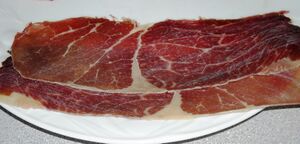Cecina de León (León cured beef)

IGP Cecina de León is Spanish cured beef which comes in one of four forms, depending on the cut: Minimum weights are 3 kg for rump, 3.5 kg for thick flank, 4 kg for topside, and 5 kg for silverside. The beef has a toasted surface colour deriving from the production process. When cut the colour is from cherry to garnet-red, the latter especially at the edges at the end of the process, with slight streakiness. Characteristic flavour, not too salty.
Geographical area: The production area comprises all the municipalities in León province
Evidence: The protected items are obtained from cutting up the hind-quarters of large cattle, preferably the native breeds of Castile and León. The acquisition of raw material and the processing are carried out under Regulating Body control; the product goes on the market certified and guaranteed by the Regulating Body.
Method of production: Once selected and trimmed, the meat is salted for a maximum of 0.6 days per kg at below 50C. It is then washed in lukewarm water and left to cure for at least 30 days. It can then be smoked over burning oak or holm oak wood for 12-16 days. Drying takes place in natural drying rooms with adjustable windows to control temperature and humidity. It remains here until maturing is complete. The whole process takes at least seven months.
Link: With its average altitude, Leon province has a dry, healthy climate which favours the curing of this product.
Gastronomy: IGP Cecina de León should be kept in a fresh, dry and well-ventilated area. In the summer months it should be kept in the fridge. It is eaten sliced or in small pieces. It can be used in the preparation of various dishes and appetisers. It goes well with all types of vegetables, and is used as a stuffing and as the main ingredient in several dishes.
Reference: The European Commission
#drying #beef #rumpsteak #vegetables #fridge #smoked #curing #spanish #cured